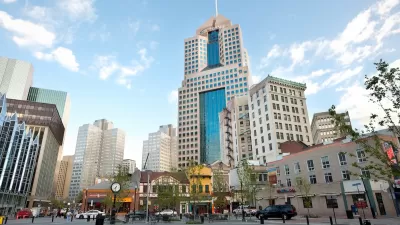The state of Pennsylvania has released Pittsburgh from the terms of Act 47, signaling a new era of fiscal security for the city, and a sign of home for the "Rust Belt."

"Fourteen years after entering a state program to restore its finances, the City of Pittsburgh has emerged from distressed status," reports Adam Smeltz.
State and local leaders gathered on Monday to formalize the city’s exit from Act 47, "which guided Pittsburgh back from the brink of bankruptcy." In effect, Act 47 "limited the city hall’s direct control over its budgets, establishing a recovery plan that cut costs, reduced the municipal workforce and managed long-term obligations such as debt and pension expenses. City finances have since swung from projected deficits to steady surpluses."
After demonstrating a stable fiscal situation over several years, the city has also put into place financial best practices to ensure fiscal health in the future.
This fiscal success if set against the ongoing redevelopment and revitalization of the city's urban core. Pittsburgh is frequently cited as an example of successful revitalization in Rust Belt cities, and Pittsburgh provides the Planetizen news feed a steady source of stories about large development investments:
- Almost a Billion Dollars of Redevelopment Investment Headed to Pittsburgh's South Shore (January 2018)
- Ferris Wheel Proposed With Big Mixed-Use Plans Near Downtown Pittsburgh (December 2017)
- Cap Park Plans Take Shape in Downtown Pittsburgh (December 2017)
- The Young History of Open Data Leadership in Pittsburgh (November 2017)
-
Three New Hospitals Slated for Pittsburgh (November 2017)
FULL STORY: 'Pittsburgh is back': City officially drops its financially distressed status

Alabama: Trump Terminates Settlements for Black Communities Harmed By Raw Sewage
Trump deemed the landmark civil rights agreement “illegal DEI and environmental justice policy.”

Study: Maui’s Plan to Convert Vacation Rentals to Long-Term Housing Could Cause Nearly $1 Billion Economic Loss
The plan would reduce visitor accommodation by 25% resulting in 1,900 jobs lost.

Planetizen Federal Action Tracker
A weekly monitor of how Trump’s orders and actions are impacting planners and planning in America.

Waymo Gets Permission to Map SF’s Market Street
If allowed to operate on the traffic-restricted street, Waymo’s autonomous taxis would have a leg up over ride-hailing competitors — and counter the city’s efforts to grow bike and pedestrian on the thoroughfare.

Parklet Symposium Highlights the Success of Shared Spaces
Parklets got a boost during the Covid-19 pandemic, when the concept was translated to outdoor dining programs that offered restaurants a lifeline during the shutdown.

Federal Homelessness Agency Places Entire Staff on Leave
The U.S. Interagency Council on Homelessness is the only federal agency dedicated to preventing and ending homelessness.
Urban Design for Planners 1: Software Tools
This six-course series explores essential urban design concepts using open source software and equips planners with the tools they need to participate fully in the urban design process.
Planning for Universal Design
Learn the tools for implementing Universal Design in planning regulations.
Caltrans
Smith Gee Studio
Institute for Housing and Urban Development Studies (IHS)
City of Grandview
Harvard GSD Executive Education
Toledo-Lucas County Plan Commissions
Salt Lake City
NYU Wagner Graduate School of Public Service





























